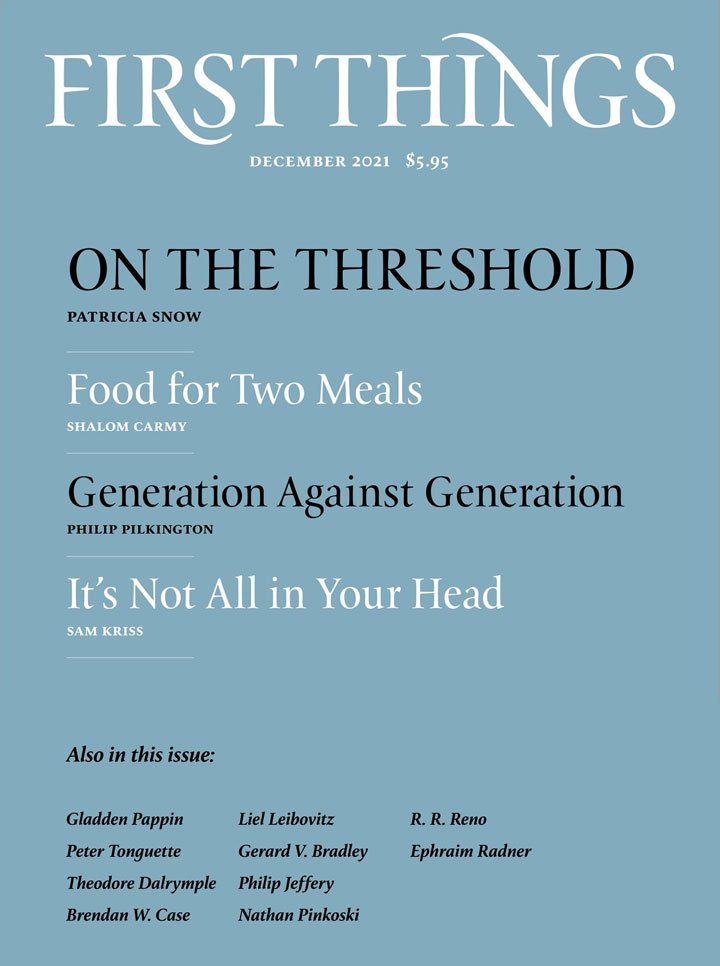It’s the most wonderful time of the year, and in our jingle-belling hearts and our hap-happiest TV ads, it’s beginning to look a lot like Christmas. But this year, Americans of all faiths concerned with preserving their religious liberties ought to join us Jews and celebrate a bit of Hanukkah.
In the popular, deracinated imagination of contemporary American liberal Judaism, the story of Hanukkah goes like this: There’s something about a miracle, something having to do with dreidels and menorahs, and, boy, how lucky are we to have a wintertime holiday and give our children presents so that they don’t feel deprived when Santa comes down the chimney of every other house on the block.
The real story, thank the Lord, is more intricate, interesting, and urgent. It begins one crisp day in 167 b.c. in the town of Modi’in, a stone’s throw from Jerusalem. Like so much of the rest of the world, the town and its citizens were under the thumb of the Seleucid empire, governed by heirs to the fruits of Alexander the Great’s conquests. Ruled by the melodiously named Antiochus—his contemporaries nicknamed him Epimanes, the Mad One—the cosmopolitan and forward-looking Seleucids deplored all those backwater boobs who bitterly clung to their spears and religion. To save his charges from a life of ignorance and incorrect beliefs, the woke Antiochus graciously decreed that all must follow the progressive Hellenistic lifestyle, or else.
To many Jews, this was an enticing proposition. Eager to show their Greek overlords that they weren’t bearded deplorables but were chic sophisticates who belonged in the finest institutions of culture and higher learning, the up-to-date Hellenized changed their names, abandoned their faith, and welcomed Zeus into their homes and hearts. Some even took pains to regrow their foreskins (the less said about their methods, the better) in order to mingle, nude and oily, in the Greek gymnasiums.
But other Jews weren’t buying any of Antiochus’s program—and this is where the real story of Hanukkah begins. Like graduate students, Twitter trolls, and other foot soldiers of today’s lunatic left, the Seleucids were fond of public spectacles of self-denunciation. So they forced a gaggle of Jews to the Modi’in town square, where they were told, in no uncertain terms, to offer sacrifices, gladly and willingly, to the Greek gods. One assimilated Jew merrily stepped forward to virtue-signal to his peers, but a certain Mattathias wasn’t amused. A zealous priest, he slaughtered not only the Jewish idolater but also the Seleucid governor. The bold act of resistance launched the uprising—two parts rebellion, one part civil war—that ended with the Maccabees, Mattathias’s faithful disciples, liberating the Temple and purifying it with the help of the Almighty, who made a drop of oil last for eight days.
You don’t have to be Jewish to feel the story’s deep emotional resonance. Staving off an intolerant, meddlesome, globalist elite that insists on draining the world of truth and beauty is, for many of us, not hazy history but pressing reality. And so, this December, let us learn from the stout old Maccabees.
Three lessons in particular come to mind.
First, know, as those ancient Jewish warriors did, that the world is not enough. In every generation, there is bound to be a haughty group of grandees who hector their fellow citizens with talk of universalism, arguing that there can be neither justice nor peace unless we all believe in the unifying power of cosmic sameness. The Maccabees realized instinctively that the opposite is true—that it is precisely our commitment to our distinct convictions, our particular traditions and teachings, that give us the ability to empathize with people who believe different things. They realized, as my friend Rabbi Dr. Ari Lamm puts it, that theirs was a struggle of “the rootedness of tradition against the imperialism of cosmopolitanism,” a struggle that rages on today. When accused of harboring some form or another of intolerance—racism, misogyny, transphobia, or whatever the slur du jour might be—we should do as the ancient Jews did. Let us remind our interlocutors, with no unnecessary subtlety, that eradicating particular ways of life in the service of this or that worldly collectivist ideal remains a monstrous form of tyranny, one that leads to oppression, not freedom.
Which leads us to lesson number two, brought to us by Mattathias himself. For too long, the lingua franca of passionate, dedicated Americans of faith forbade others to raise their voices or coarsen their tongues. Civility, we were repeatedly and gravely told, is the trademark of a self-respecting human being. We were therefore instructed to ignore, if not altogether scorn, political candidates or cultural movements that felt too gritty and raw. Such purity of heart is commendable. But truth be told, it is of very little use when modern-day Seleucids hack away at the very tenets of reality—such as the existence of biological differences between men and women.
As that great latter-day Maccabee Barry Goldwater so neatly put it, “extremism in the defense of liberty is no vice,” and “moderation in the pursuit of justice is no virtue.” The ancient Jews, bless their souls, had to risk life and limb to prove this point; we, thankfully, have a less dire and, one prays, non-violent path ahead. But we’ve no choice but to emulate Maccabean resolve. When threats that you will be branded untouchable in polite society are used to force you to denounce your faith, the answer isn’t to offer a well-reasoned and timidly delivered counterargument. It’s to fight back, tooth and nail, and deny the wreckers of civilization the pleasure of victory.
How to do that? Enter lesson number three. It is found in the Second Book of Maccabees, considered apocryphal by Jews but adopted as canonical by the Catholic Church and their Eastern Orthodox brothers. There we gain one small but stirring insight from Judah, Mattathias’s son and the general who led the revolt to its happy ending. Chapter 5 informs us that Judah, along with nine others, “withdrew himself into the wilderness, and lived in the mountains after the manner of beasts, with his company, who fed on herbs continually, lest they should be partakers of the pollution.” These brave souls understood that fighting an overwhelming and corrosive culture means first and foremost rejecting all its vile offerings.
For Judah and his comrades, this retreat meant living like animals on grass alone. We lucky souls have it much easier. All we have to do is say “no” to the torrent of propaganda consecrated by commerce and thinly disguised as entertainment, falsehoods sold as a high-minded new moralism that aims to replace our deeper human connections. Every time we demure when asked if we’d like to see the latest Netflix confection, opting to read a great book instead; every time we make an effort to patronize the local butcher rather than buying cheap industrial meat in the supermarket; every time we opt to spare our children the burden of a brainwashing in the modern Antiochian academia and educate them according to our trustworthy traditions, we emulate Judah, taking one small but significant step toward liberation.
So Chag Sameach, or happy holiday. It’s a greeting worthy of all believers. Our oppressors are real and mighty, but we’ve heard the story before. It begins with the empire imagined to be too big to fail, and ends with the regime lying in ruins, while the passionate servants of the Almighty proceed to worship as they always have and always will. Jews have been telling themselves this story for nearly two thousand years, which is one big reason why we’ve survived when so many tried so assiduously to snuff us out. I’m delighted to share this gritty truth with other people of faith who are under attack. The candles burn brightly. Welcome to Hanukkah.
Liel Leibovitz is editor at large for Tablet Magazine and the cohost of its popular podcast, Unorthodox.
Redemptor Hominis: More Important than Ever
Forty-seven years ago, Pope John Paul II issued his first encyclical, Redemptor Hominis (The Redeemer of Man).…
Providence After the Death of God
Modern Christians confront a paradox that has shaped the last two centuries: The very idea that history…
Smooth Sailing
I regularly fume as I am caught in the chain of red lights that mark my rides…



